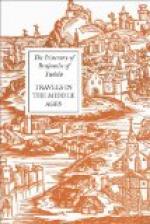[p.87]
The Jews then took counsel together, and resolved to propitiate the king on account of the Jews who were in exile in his Empire. Then the king entered their land with his army, and stayed there fifteen days. And they showed him much honour, and also sent a dispatch to the Kofar-al-Turak their allies, reporting the matter to them. Thereupon the latter occupied the mountain passes in force with a large army composed of all those who dwelt in that desert, and when the king of Persia went forth to fight with them, they placed themselves in battle array against him. The Kofar-al-Turak army was victorious and slew many of the Persian host, and the king of Persia fled with only a few followers to his own country[169].
[p.88]
Now a horseman, one of the servants of the king of Persia, enticed a Jew, whose name was R. Moses, to come with him, and when he came to the land of Persia this horseman made the Jew his slave. One day the archers came before the king to give a display of their skill and no one among them could be found to draw the bow like this R. Moses. Then the king inquired of him by means of an interpreter who knew his language, and he related all that the horseman had done to him. Thereupon the king at once granted him his liberty, had him clad in robes of silk, gave him gifts, and said to him, “If thou wilt embrace our religion, I will make thee a rich man and steward of my house,” but he answered, “My lord, I cannot do this thing.” Then the king took him and placed him in the house of the Chief Rabbi of the Ispahan community, Sar Shalom, who gave him his daughter to wife. This same R. Moses told me all these things.
Thence one returns to the land of Khuzistan which is by the river Tigris, and one goes down the river which falls into the Indian Ocean unto an island called Kish[170]. It is a six days’ journey to reach this island.
[p.89]




